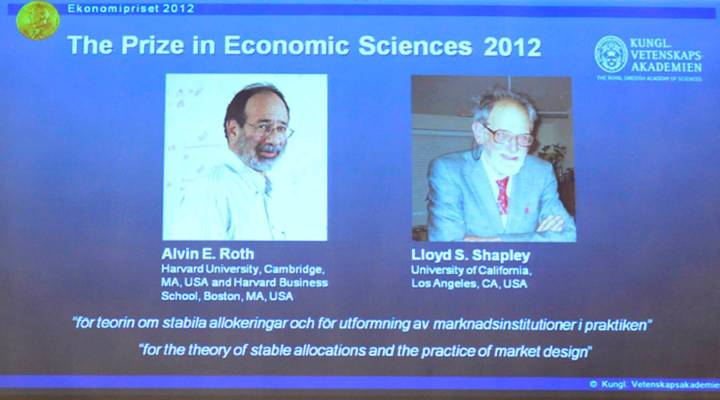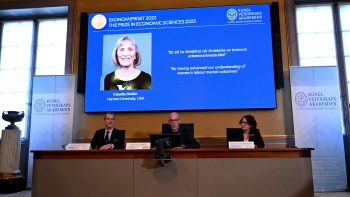
Nobel awarded for economics of matchmaking

The big economic news of the day is the Nobel Prize in economics. It went this morning to two Americans: Alvin Roth, he’s an economist formerly at Harvard, now at Stanford, and Lloyd Shapley, professor emeritus at UCLA. Roth and Shapley won for what’s known as Matching Theory.
Matching theory is the economics of choice when you aren’t the only one choosing. At a press conference earlier today at Stanford University, economist Alvin Roth said his theory applies to people’s lives in all kinds of ways, helping them solve problems.
“When they get into schools, when they choose careers, when they get married, these are all matching markets,” he says. “You can’t just choose what you want, you also have to be chosen.”
Roth and Shapley’s work has been used to help match kids with public schools, medical students with residencies and kidney patients with living donors. Ruthanne Hanto, a program manager for a national kidney donation program, UNOS, has worked with Roth for years and says his program has saved more than 2,000 lives.
“Al has taken incompatibility out of the equation for living kidney donation,” she says.
Hanto says kidney patients would often have willing donors, but sometimes those donors weren’t a match because of blood type, for example. Roth’s work enabled transplant centers to pair up the willing donor and the patient in need.
“The program matches the incompatible donor with a recipient they’re compatible with,” Hanto explains. “Then that person’s donor with a recipient they’re compatible with. So all the donors get to donate and all the recipients get to receive a kidney.”
But matching theory applies to all kinds of things, great and small says Christopher Whalen, senior managing director at Tangent Capital Partners.
“The utility of matching is that you are defining a relationship and you’re saying to people who either have whatever it is or need it,” he says. “It’s like online dating.”
Whalen says whether it be everlasting love on eHarmony or Everlast boxing gloves, matching theory applies. Like if you type “boxing gloves” into Google or Amazon, they will match you up with companies that want to sell them to you.
“That’s a revolutionary thing,” says Whalen.
And pure economics.
There’s a lot happening in the world. Through it all, Marketplace is here for you.
You rely on Marketplace to break down the world’s events and tell you how it affects you in a fact-based, approachable way. We rely on your financial support to keep making that possible.
Your donation today powers the independent journalism that you rely on. For just $5/month, you can help sustain Marketplace so we can keep reporting on the things that matter to you.

















